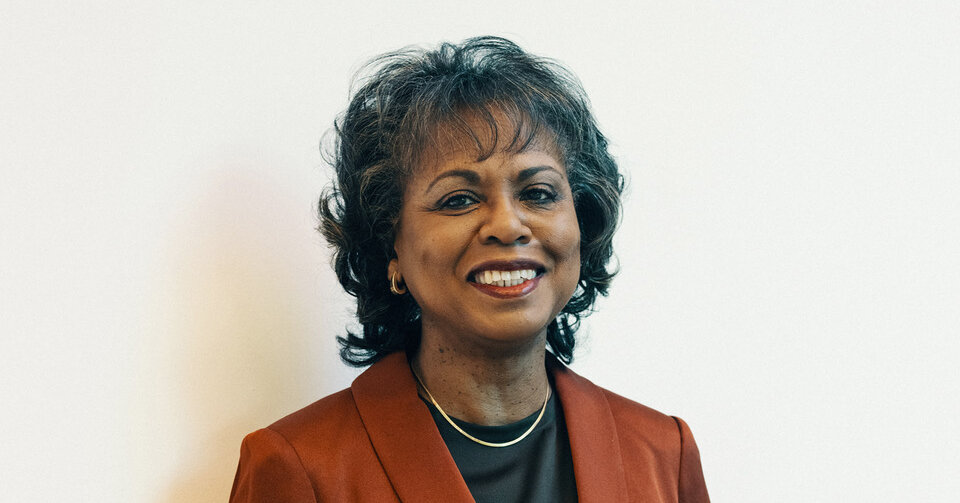
Anita Hill still speaks in the measured tones she did while being questioned before an all-white, all-male panel before the Senate in 1991 — a young law professor in a blue linen suit who would give the nation an overnight education in workplace sexual harassment.
Thirty years later, she is more academic than activist, focusing on pathways to progress, and continuing to teach law as a professor of social policy, law and gender studies at Brandeis University.
But to be honest, Hill’s patience is waning. “I really am running out,” she said in a video interview from her home in Massachusetts earlier this month.
Her new book, “Believing: Our Thirty-Year Journey to End Gender Violence,” due out on Tuesday from Viking, aims to channel that impatience into something more substantive — a manifesto of sorts.
Through interviews, personal accounts and social and legal analysis, Hill, 65, aims to connect the dots between seemingly disparate social ills — school shootings, campus sexual assault, domestic violence and homelessness, as well as the gender and racial dynamics behind each — to show how they create a culture in which gender-based violence is able to thrive. She describes it as “the literal and figurative foot on women’s necks.”
This is Hill’s third book and, as she notes, perhaps her most ambitious. “It is a bit like trying to boil the ocean,” she said, but until we see the problem holistically, “we can’t really fix any one piece.”
Hill spoke about her Senate testimony, its aftermath, #MeToo and her recent conversation with Christine Blasey Ford. These are edited excerpts from the conversation.
You weave history throughout your book, including some fascinating case law about sexual harassment. But to me one of the most shocking things was learning that it was Redbook of all places that conducted the first national survey on sexual harassment, in 1976. Not Harvard Business Review, not the federal government — a women’s magazine.
Redbook did it because Redbook was the one that cared. That investment should have been made by our government. A few years ago, Senators Murray, Warren, Feinstein and Gillibrand asked to have the economic costs of harassment in the workplace measured. They wrote a letter. As far as I know, they never got a response. So Redbook did us all a favor, because we wouldn’t even really have information to validate what has been happening to us for generations if we didn’t have that survey. And even now, there is still no comprehensive measurement of the rate or economic cost of sexual harassment in the United States.
You tell a story in the book about your older brother, Albert, cautioning you not to drink the punch when you went off to college. I’ve heard a version of this warning a hundred times, and yet I don’t think I ever stopped to think about the implication. To me, reading that was one of those “aha” moments of realizing just how baked into our culture the assumption of sexual violence is.
It’s almost as though we’re accepting it. And we’re saying to young women — the one in four who are likely to be sexually assaulted their freshman or sophomore year of college — that you’re sort of on your own, because it’s inevitable that these things happen.
I was 10 when you testified before the Senate Judiciary Committee. I don’t remember really understanding what was happening, but I do remember my father insisting that we leave the television on. For those who didn’t live through the testimony, can we just take a moment to note how bizarre the whole thing was? There was a senator suggesting you’d taken inspiration for your charges from “The Exorcist.”
It was so bizarre that it was hard to be even seeing it as real. You question, like, Is this really happening?
And yet the thing that stuck with so many people was your composure.
I think in many ways I was prepared by life. I grew up in a household with a mother who was quite measured. She got things done. And we learned that she was very serious, even though she was not, you know, screaming and yelling — which you might expect on many occasions if you are a mother of 13 children.
To what extent were you aware that being unflappable was almost required of you, as a Black woman testifying before an all-white male panel?
The nature of the challenges that were thrown at me, and certainly the setting, made that testimony like no other experience I’d ever had. But pieces of it I had experienced before — as a Black woman who, for example, stands in front of a class of students who, at the time I started my teaching, were mostly men and mostly white men, and stands as an authority figure. I’m going to be somebody who’s going to be challenged. Because some of them had never had to interact with a Black woman as an authority figure.
The problem with the Senate was that the judiciary committee members had never interacted with a Black woman as an authority on even her own life. I knew, from the tone and the language that was used, and just the way that people looked at me, that they were questioning my right to be there and my right to have a voice. And that was familiar. That wasn’t new. And so, unfortunately, I had practiced how to respond in those circumstances.
How did that experience affect you in the years after?
It was hard, but it helped that I had solid relationships. Because relationships are the first thing that you are concerned about. What’s going to happen to my friendships? What’s going to happen to family members who might not want to be associated with this whole experience? I did lose people who just will not even speak to me, even to this day. So that part was painful. But I think I was able to withstand because I had so many people who had supported me.
It was interesting, my father would say to people — in this little town that I grew up, out in rural Oklahoma — he would say, “Oh, I’m Anita’s father.” And I would say, “You know, Dad, you might not want to just say that to everybody.” But he was determined, and our relationship became even stronger because of that.
One of your chapters is titled “the myth of the woke generation.” What does that mean?
It’s about our belief that a generation will come along and realize that all of these differences that we use to keep people down — whether it’s race or gender or sexual identity or gender identity or class — that all of those things really don’t matter. That this generation will see people as equal, and because of that, the problems will go away, all the biases will be gone. And it’s a myth for two reasons: one, because there is always a mix of beliefs in any generation. But also because there are going to be systems that are biased, and the only way that they’re going to be successful in those systems is to accommodate some of those biases. What we need to do is change the systems, but it’s not going to happen overnight. We can’t expect one generation to correct them.
You seem to have a lot of patience in that regard.
I don’t know. I’m running out. I really am running out. And that was part of the urgency for me in writing this book — it’s like, I don’t know how much longer I’m going to be doing this. I don’t even know how much longer I’m going to be around. I want to get all of this out.
You chair the Hollywood Commission, which works to eliminate sexual harassment in the entertainment industry. Last month, we saw the implosion of another Hollywood group formed in the wake of #MeToo — Time’s Up. Is the reality of power in this country that if you get too close to it, you are bound to be complicit in its abuse in some way?
I don’t think it’s inevitable. I think that you can have a Times Up that puts survivors and victims and the interest of equality and equity first. And I think that when Times Up returns, that’ll be front and center in their minds. I do think that any time you have an organization that is focused on changing governmental policy, it’s very difficult to avoid at least the appearance of complicity.
I don’t know what all of the facts were in this case. I know the things that I’ve heard, and I can understand the outrage. But I also know that — and maybe this is my own personal bias about politics — that it’s an institution that almost forces people to compromise. And the question is, how do you maintain your integrity and principle and still do what you need to do to get legislation passed?
You called the 168-page report by New York’s attorney general Letitia James — that ultimately led to Governor Andrew Cuomo’s resignation over accusations of sexual misconduct — a model for how other institutions might investigate misconduct claims. Why?
We have a moment in this Cuomo situation where we got as close as we could possibly get to the right kind of investigation, the right kind of treatment. You’re the governor, but you’re not above the law. We are going to investigate you. We’re going to find the body to do it. We’re going to set up a process for doing it. We’re going to explain what we’re doing. We’re going to explain our outcomes and why we reached them. And we’re going to make an announcement and reach a conclusion.
I mean, that seems so textbook. I think it’s getting lost because of the situation with Time’s Up. But also because we are looking at this from a political lens as opposed to the lens of, how do we address this systemic problem in society? What is one thing we can do? And that is to put together an appropriate system.
Could such a system conceivably resolve some of the debate about “due process”?
If you put in place a system, then you don’t have people saying, “Well, it’s just a ‘he said, she said.’” You’d get rid of that — because you’d have a record. You have a way for confirming facts. You have testimony and standards. And so yes, absolutely. You’d get rid of some of the public uncertainty around these issues.
You recently spoke with Christine Blasey Ford for a new podcast. What was that like?
It was wonderful to be able to sit down and talk with her because our experiences — while unique to each of us — are shared. And to be able to have a conversation with someone, with the benefit of hindsight, it was good for me, and I wanted to reassure her that one day she will be able to put it all in perspective.
When you were testifying, women made buttons that said “I believe Anita.” What do you make of the slogan, “believe all women”?
We have this cultural presumption that women lie about their experiences of abuse. We should get beyond that. We know that the rate of false claims is very low — that’s the fact. But most importantly, if we have the right processes, we don’t have to have those slogans. We will have the facts to support what actually is happening. And we won’t have to resort to slogans.




